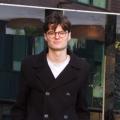
To celebrate the start of LGBT+ History Month, a leading Wellcome Genome Campus scientist explains why lesbian, gay, bisexual and transgender visibility is important for 21st-century science.
“Leonardo Da Vinci was allegedly queer,” said Natalie Lazar Adler, who leads a research team at the Wellcome Genome Campus in Hinxton.
“I think I would choose him as my favourite person to think about during LGBT+ History Month.”
Throughout February, Natalie is celebrating lesbian, gay, bisexual and transgender history with the genome campus’ LGBTQ+ Network.
She has said that LGBTQ+ history cannot be separated from science, and that there is still a need for events like History Month.
Natalie added that there are plenty of scientists and mathematicians throughout time who have faced persecution for their sexuality, but most are remembered for their professional work.
She said: “We can’t ascribe contemporary terms like ‘gay’ or ‘asexual’ to Da Vinci, but we think that he was persecuted at one point for his sexuality.
“But that’s not why I like him.
“I like him because he is a great example of the right-left brain.
“He helps to deconstruct the view that scientists aren’t creative people – he looked at patterns.
“His approach to science was incredible – he just happened to be queer.”
It is thought that Leonardo Da Vinci had a brush with Florentine authorities in 1476, when he was alleged to have been involved in “wretched affairs” with a man.
Closer to Hinxton, Alan Turing began studying at King’s College, Cambridge in 1931.
The mathematician – famous for cracking the Enigma Code during World War Two – was convicted of gross indecency for his relationship with a man in the 1950s.
Natalie said: “Science and sexuality cross over more than you might think.
“People often ask 'is there a genetic basis for being queer?'
"But I'm far more interested in LGBTQ+ sociology.
"Take the trans population, for example.
"When press articles come out about trans people, you can track the spikes in negative comments using data.
"That's where the media is a negative force - in potentially fuelling anti-trans views.
"But there is a positive side to that. We can measure how opinions are developing."
Natalie said there is still more work to be done.
She said: "Scientists who go abroad sometimes forego trips which could ultimately feed into groundbreaking research.
"We face barriers to work that do not impact other people - that's why we need events just like this."



Comments: Our rules
We want our comments to be a lively and valuable part of our community - a place where readers can debate and engage with the most important local issues. The ability to comment on our stories is a privilege, not a right, however, and that privilege may be withdrawn if it is abused or misused.
Please report any comments that break our rules.
Read the rules here